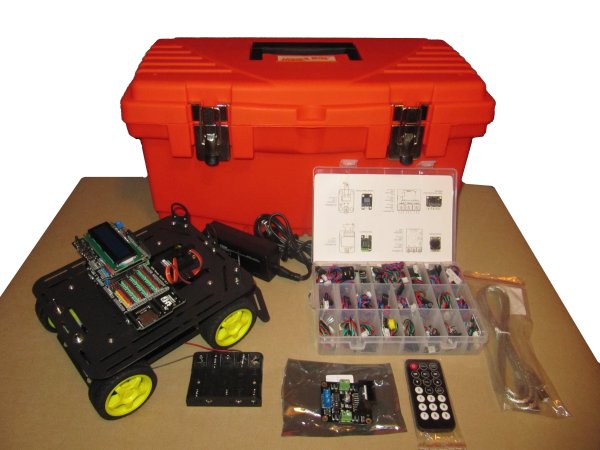IEEE JRACS Event: Arduino Robotics Workshops
Dear IEEE Members,
This is an announcement for an IEEE JRACS Chapter Event.
Event: IEEE JRACS Arduino Robotics Workshop
Date/Time: September 24, 2015 5:00 pm – 9:00 pm
Registration: Starts August 17, 2015 and ends Sep 22. Non-US Citizens must register by Sep 17. Limited to 20 participants.
Priority registration, for IEEE Members only, will be available by August 17; August 19 for non-IEEE members.
Registration Link: https://meetings.vtools.ieee.org/m/35598
Registration Costs & Schedule:
$20 for IEEE JRACS Members, starts Aug 17, IEEE non-JRACS members can join RAS for additional $9 @ieee.org
$10 for IEEE Students & Graduate Students Members, starts Aug 17
$30 for Other IEEE Members (if not wanting to save by joining RAS instead), starts Aug 19
$40 for Non-IEEE participants, starts Aug 19
Non-US Citizens must register by Sep 17
We are looking for volunteers to help with the workshop organization, logistics, and technical support.
Registered participants and volunteers can optionally request to pick up the Arduino Robotics Kits in advance of the workshop to assemble the Baron-4WD Mobile Platform. Complete assembly instructions can be found at: http://www.dfrobot.com/index.php?route=product/product&product_id=261#.VdD9ZvlVhBc.
Location:
Dynetics, Inc.,
Solutions Complex, Main Conference Room
1004 Explorer Blvd., Huntsville AL
The IEEE Arduino Robotics Workshops aim to train chapter members and the community at large in the use of open-source low-cost robotic platforms. We are planning to deliver basic and advanced Arduino-Based Robotics Workshops to introduce novice and experienced users to low-cost commercial-of-the-shelf (COTS) robotic modules to foster wide-spread development of robotics applications. The format of this event will be a hands-on experience and not a classroom/lecture type event. During the workshop, every team of two participants will be able to use one of our IEEE JRACS Arduino Robotics Kits (featuring over 30 different sensors/actuators and powered by an Arduino Mega ADK board). Participants should bring a laptop computer for code development and download. Required software (Arduino 1.6.5) is available here. And must be pre-installed if possible. Language reference is available here.
The IEEE Robotics and Automation Society (RAS) provided a $2000.00 grant to purchase the hardware kits used in these workshops. These kits will remain with the IEEE JRACS chapter for use in future basic and advanced robotics workshops. Registration fees cover the cost of pizza, drinks, consumables and printed materials.
Workshop participants will be given priority to borrow the IEEE JRACS Arduino Robotics Kits after the workshop for further experimentation and learning. The kits must be returned to IEEE within a 3 month period depending on demand.

IEEE JRACS Arduino Robotics Workshop Kit
Given that the IEEE Robotics and Automation Society provided financial support for purchasing all hardware to be used in this workshop, priority registration will be given to IEEE JRACS members. IEEE members that are not JRACS members can join the Robotics and Automation Society for only $9 to receive a discount in the registration fee. After a few days of priority registration for IEEE members, event registration will be opened to the public.
These are open events, so please feel free to forward this information to your colleagues or anyone that could be interested in the topic.
Workshop Agenda:
4:30pm Networking & Registration
5:00pm Workshop Session 1 (Modules 1 & 2)
6:45pm Break
7:00pm Workshop Session 2 (Modules 3 & 4)
8:30pm Robotic Demos
9:00pm Adjourn
Best,
IEEE Huntsville, Joint Robotics & Automation – Controls Systems (JRACS) Chapter
Workshop Details
For curriculum preparation, we are planning to rely heavily in already well developed Arduino training resources including but not limited to:
- https://www.arduino.cc/en/Tutorial/HomePage (Arduino Homepage)
- http://tronixstuff.com/tutorials/ (50 Tutorials)
- http://www.ladyada.net/learn/arduino/
- http://communityofrobots.com/tutorial/kawal/how-make-your-first-robot-using-arduino
The workshops will deliver 4 training modules for basic and advanced levels. The workshop hardware is comprised of 10 Custom IEEE JRACS Arduino Robotics Workshop Kit that will provide a physical platform for members to learn how to use software and hardware functionality readily available today and in this way foster their interest in robotics applications in all areas. Each workshop will be 4 hours long and will enable the participant to have hands on robotics applications by using a variety of sensors and actuators in combination with Arduino based micro-controllers.
The outline of the Basic Level Workshop is as follows:
Module 1
- Introduction to Arduino
- Setting up your system
- Basic digital input/outputs
Module 2
- Serial Communications
- Pulse-width modulation
- Reading analogue inputs
Module 3
- Using LCD screens
- Controlling relays
- Infra-red remote control
Module 4
- Controlling servo motors
- Using I2C protocol
- Using temperature, magnetic, vibration and tilt sensors



